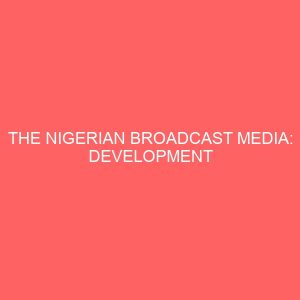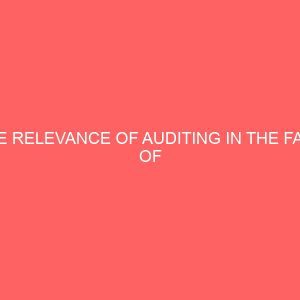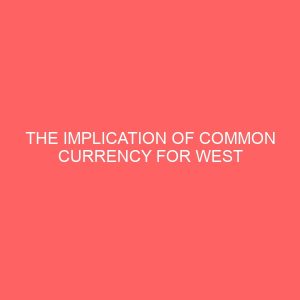Description
Universal banking has been of controversial issue among practitioners and regulation of financial sub-sector of Nigeria economy.
However most of these decisions have been flamed by lack of common understanding of what universal banking is and what its implication might be for the country’s financial and economic well being.
The research attempt to redress that situation by presenting a well accepted understanding of the system.
Secondly, discussing its applicability or lack thereof to Nigeria commercial services and industry and assessing how effective such system could be in Nigeria.
Interview was conducted by the researchers to understand the profile of the case study: Afri bank plc. And how the bank practices universal banking.
Both primary and secondary data was used to also carryout the research work.
Title Page II
Dedication III
Acknowledgement IV
Abstract V
Table of content VI
CHAPTER ONE: INTRODUCTION
1.1 Background of the study 1
1.2 Afribank plc profile and location 3
1.3 Universal banking as practiced by Arfribank. 4
1.4 Statement of the problem 4
1.5 Purpose of the study 5
1.6 Research questions 6
1.7 Significance of study 7
1.8 Scope and limitation and delimitation 7
1.9 Definition of terms/concept 8
Reference 10
CHAPTER TWO: LITERATURE REVIEW
2.1 Definition of universal banking 12
2.2 Before the introduction of universal banking in Afribank. 17
2.3 Origin of universal banking in Afribank 17
2.4 Universal banking concept in Afribank. 20
2.5 Universal banking and supervisory authorities 22
2.6 Argument for and against universal banking 24
2.7 The merits of universal banking 25
Reference 27
CHAPTER THREE: RESEARCH METHOD AND DESIGN
3.1 Research method and design 29
3.2 Sources of data 29
3.3 Population 30
3.4 Sampling method 31
3.5 Method of analysis 32
Reference 34
CHAPTER FOUR: DATA PRESENTATION AND METHODOLOGY
4.1 Testing questionnaire analysis and methodology 35
4.2 Hypothesis testing 39
Reference 43
CHAPTER FIVE: FINDINGS, RECOMMENDATIONS AND CONCLUSION
5.1 Findings 44
5.2 Recommendations 45
5.3 Conclusion 46
Bibliography 48
Appendix 50








Reviews
There are no reviews yet.